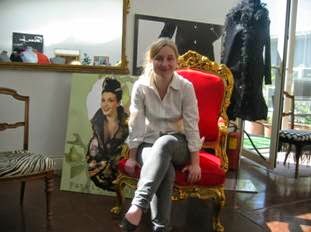Entrevista realizada por Laura
Tressel.
Traducida por Miriam Jiménez.
Hola Julie, ¿Puedes contarnos un poco acerca de tu
pasantía y cuál es la labor que desempeñas?
Estoy realizando un período de prácticas
en
Gestión Comercial y Marketing para una joyería muy prestigiosa situada en Piazza Santa Croce. Fundamentalmente, mi
labor es encargarme de todos los medios de comunicación social o ‘Social Media’ de la tienda, además de servir
como vehículo entre los clientes y CEO cuando llevan a cabo comunicaciones a
través de correo electrónico y Facebook. Tambien hago marketing del producto.
Tomo fotos de muchos de los objetos de la tienda y posteriormente las publico
en la página web de la empresa. Por otro lado, estoy a cargo del boletín de
noticias mensual de la tienda, el cual estaré realizando durante el mes de
enero, incluso después de que acabe mi pasantía.
¿Has aprendido algo especialmente
interesante durante este tiempo?
He aprendido cómo identificar piedras preciosas. He estado tomando fotos de las joyas
en la tienda para publicarlas en la página de Facebook.
Una vez etiqueté una pieza como safiro, pero
realmente era una tanzanita. Mi jefa no se enfadó, sino que, por
el contrario, pensó que lo ocurrido era muy
gracioso. Pero ahora conozco todas las diferencias existentes entre las
diferentes piedras.
¿Qué estás estudiando en la escuela y cómo lo aplicas aquí?
Mi especialidad es la Gestión Politica y Sanitaria. Es cierto que no está muy relacionado con el tipo de pasantía que estoy
realizando y es un poco anecdótico cómo ocurrió todo… Encontré el Istituto Europeo a través de internet, debido a que yo había estudiado en
Florencia durante el otoño, y quería volver, ya que realmente me gustó.
Sentí que no había pasado tiempo suficiente en
Florencia, y además, quería continuar aprendiendo italiano. Cuando fui aceptada en el Programa de
Prácticas, me comunicaron que no había ninguna pasantía disponible para mi campo de estudio, por lo que mi Curriculum Vitae fue enviado a varias
empresas. Fue entonces cuando ésta tienda se interesó por mí debido a que yo tenía experiencia en medios de
comunicación social o ‘social
media’, y fue así como acabé trabajando aquí.
Cuéntanos más acerca de porqué volviste de nuevo a Florencia
tras estudiar aquí durante el otoño.
Pues, el motivo principal es
que realmente quería aprender italiano, y además, sabía que esta iba a ser más que una experiencia, y más divertida que
si hacía una pasantía en casa, en Nueva
Jersey. En cuanto a mi nivel de italiano, definitivamente está mejorando, aunque aún no tengo demasiada fluidez, ya que esto requiere
años, pero creo que las clases en el Istituto Europeo fueron geniales porque
aprendí muchísima gramática, la cual no sabía antes de venir. Ahora logro
entender mucho más durante una conversación y puedo hablar más, lo cual es increíble.
¿Qué es lo mejor de vivir aquí?
Siempre hay algo que hacer
en Florencia. A veces hay festivales o diferentes exhibiciones, pero siempre
hay algo. Por otro lado, la comida es definitivamente genial. No tengo
restaurante favorito porque siempre intento probar a comer en diferentes
lugares. Hay un sitio que realmente me gusta, llamado ‘Pane e Toscana’. Tienen sandwiches con salami de jabalí, queso de
oveja y mermelada de arándanos. Puede que no suene demasiado bien, pero creeme,
son deliciosos.
¿Qué consejos le darías a un futuro estudiante o
pasante que venga a Florencia?
Primero de todo, sobre el
clima, hace mucho calor durante el verano, así que le aconsejaría que viniera preparado/a para ello. Además, es importante
que, si viene para realizar un período de prácticas o pasantía, tenga
una mente abierta. Le diría que no piense que no le
beneficia el hecho de que las prácticas no sean de su campo de
estudio, ya que cualquier experiencia es buena, y más que una experiencia académica, se vive una
experiencia cultural y de vida.
Se aprende cómo funciona el ambiente de
trabajo, el cual está basado en la combinación de las diferentes
culturas y valores. Aprender el idioma es definitiviamente una ventaja, porque
les dará mucho para ofrecer. Creo que todo el mundo debería vivir la experiencia de vivir en otra parte del mundo en algún
momento de su vida, ya que de otro modo, nunca
entenderán realmente cómo funciona el mundo. Se volverán más comprensivos y tolerantes hacia los demás, y creo que
esto te hace más amigable porque quieres
conocer gente, hablar con ellos y aprender de sus diferentes experiencias.
¿Crees que volverás de nuevo?
Me encanta Florencia. Me gustaría volver,
pero no lo sé porque me gustaría vivir una experiencia como esta en otras
partes de Italia que no he conocido todavía. Florencia siempre tendrá un lugar
especial en mi corazón, así que estoy segura de que volveré en algún momento de mi vida.






